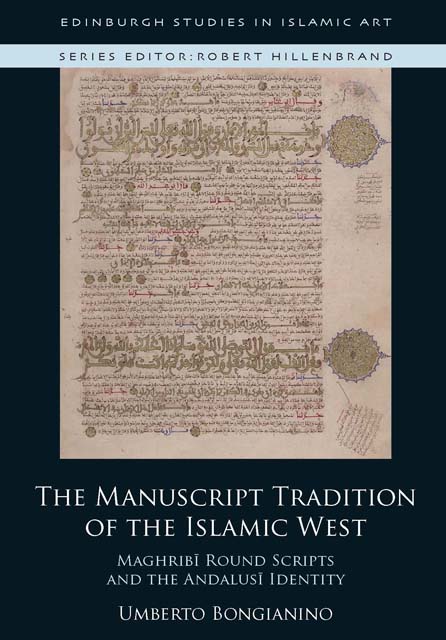Book contents
- Frontmatter
- Contents
- List of Figures
- Acknowledgements
- Note on Transliteration and Translation
- Abbreviations
- Series Editor’s Foreword
- Introduction: A Book about Books
- Chapter One Maghribī Round Scripts: A New Definition
- Chapter Two Maghribī Round Scripts in the Third/Ninth and Fourth/Tenth Centuries
- Chapter Three Maghribī Round Scripts in the Fifth/Eleventh Century
- Chapter Four Maghribī Round Scripts in the Sixth/Twelfth Century
- Chapter Five Beyond Books: Quranic Manuscripts and Chancery Documents
- Conclusion: Inscribed Identities
- I List of Dated Manuscripts
- II Titles and Genres of Dated Manuscripts
- III Copyists of Dated Manuscripts
- IV Places of Copying
- V Remarkable Colophons and Notes
- Glossary
- Bibliography
- Index
Chapter Three - Maghribī Round Scripts in the Fifth/Eleventh Century
Published online by Cambridge University Press: 18 November 2022
- Frontmatter
- Contents
- List of Figures
- Acknowledgements
- Note on Transliteration and Translation
- Abbreviations
- Series Editor’s Foreword
- Introduction: A Book about Books
- Chapter One Maghribī Round Scripts: A New Definition
- Chapter Two Maghribī Round Scripts in the Third/Ninth and Fourth/Tenth Centuries
- Chapter Three Maghribī Round Scripts in the Fifth/Eleventh Century
- Chapter Four Maghribī Round Scripts in the Sixth/Twelfth Century
- Chapter Five Beyond Books: Quranic Manuscripts and Chancery Documents
- Conclusion: Inscribed Identities
- I List of Dated Manuscripts
- II Titles and Genres of Dated Manuscripts
- III Copyists of Dated Manuscripts
- IV Places of Copying
- V Remarkable Colophons and Notes
- Glossary
- Bibliography
- Index
Summary
Book culture and production in the Ṭāʾifa kingdoms
ACCORDING TO THE astronomer and judge of Toledo Ṣāʿid b. Aḥmad al-Taghlibī (d. 462/1070), it was the dispersal of the books of the caliphal library of Cordova that caused the intellectual flourishing of al-Andalus in the period of the so-called ‘petty kingdoms’ (tawāʾif, sing. ṭāʾifa, roughly 402/1013–487/1094). In the winter of 401/1011, during the siege of the Umayyad capital by the Berber troops of the anti-caliph Sulaymān al-Mustaʿīn, the chamberlain Wāḍiḥ sold most of the palace's books to raise money for the defence of the city; the remainder was plundered when the besiegers finally entered Cordova two years later. In his Ṭabaqāt al-umam (‘Categories of Nations’), written in 460/1068, Ṣʿid reflects on the consequences of the collapse the Umayyad caliphate in these terms:
At the beginning of the fourth century of the hijra, al-Andalus was divided up by the Umayyads’ opponents and the ṭawāʾ if came into being, with each king taking one of the country's cities as his own capital. The kings of the great civilisation of Cordova became preoccupied with these taxing revolts, and the civil war forced them to sell the treasures that remained in the palace of Cordova, the collection of books, and the other furnishings. They were sold at trivial values and at the cheapest prices: as a result, those books were scattered all over al-Andalus. Among them, people have found nuggets of ancient wisdom, saved from the hands of the inquisitors that had censored the intellectual endeavours of al-Ḥakam [II], in the days of al-Manṣūr b. Abī ʿĀmir. Also, those who so desired have now disclosed what they possess of these [ancient scientific works]. Since then, interest in learning the ancient sciences has continued to grow little by little, and the capitals of the ṭawāʾ if have increasingly become centres of civilisation, until today.
The current situation in al-Andalus – praise be to God – is better [than in the past], since the ancient sciences are now permitted, and all restrictions to their study have been removed.
- Type
- Chapter
- Information
- The Manuscript Tradition of the Islamic WestMaghribi Round Scripts and Andalusi Identity, pp. 125 - 170Publisher: Edinburgh University PressPrint publication year: 2022



